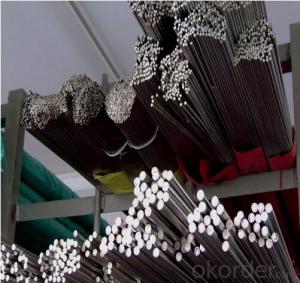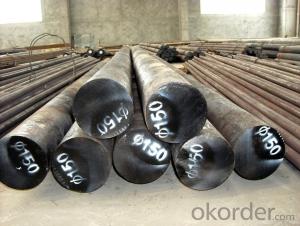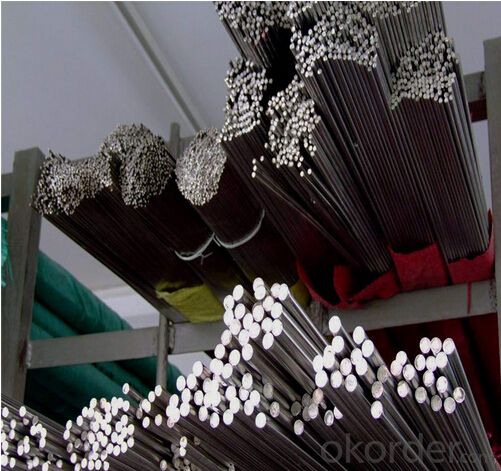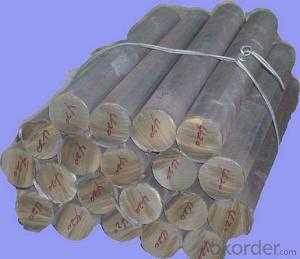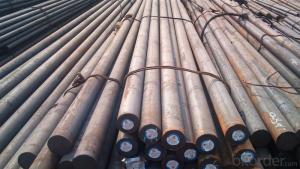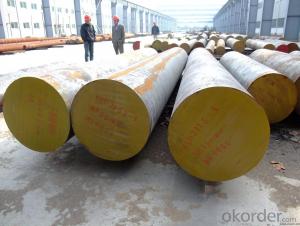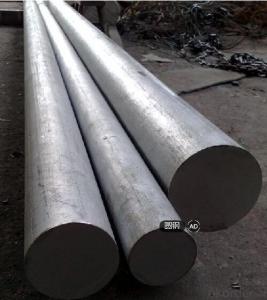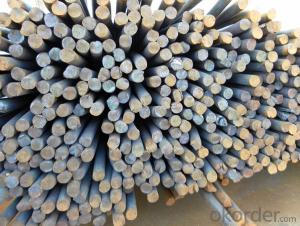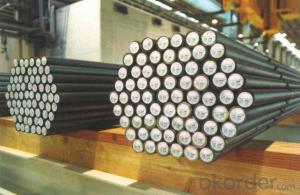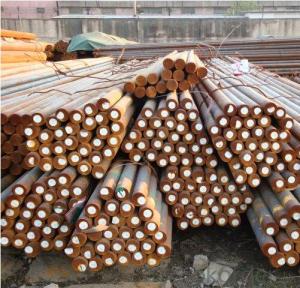Tool Steel SKD10,Cr12Mo1V1, D2,1.2379,2379 Steel Round Bar
- Loading Port:
- China main port
- Payment Terms:
- TT OR LC
- Min Order Qty:
- 25 m.t.
- Supply Capability:
- 10000 m.t./month
OKorder Service Pledge
OKorder Financial Service
You Might Also Like
Specification
The details of our Steel
1. Produce Standard: as the GB, AISI, ASTM, SAE, EN, BS, DIN, JIS Industry Standard
2. Produce processes: Smelt Iron -EAF smelt Billet - ESR smelt Billet -Hot rolled or forged get the steel round bar and plate
3. Heat treatment:
Normalized / Annealed / Quenched+Tempered
4. Quality assurance:
All order we can received Third party inspection, You can let SGS, BV,.. and others test company test and inspect our products before Goods shipping.
Product information
1.ChemicalComposition(%) | CSiMnCrMoVPS1.40-1.60≤0.40≤0.60≥11≥0.8≥0.2≤0.030≤0.030
|
2.Equivalent Grades | SKD10/ D2/ 1.2379 |
3.Form&Size | 1)1.2379 Tool Steel round bars, flat/square bars,plates,sheets. |
2)DIN 1.2379 Tool Steel Size Available(Length can be customized)
| |
4.Round bar | Diameter (mm) Length (mm) Round bar: 12~50 x 2000~5800 Hot rolled |
5.Flat bar | Thickness(mm) Width(mm) Length (mm) |
6.Surface Condition | 1)Black,Peeled,Turned,Grinded; 2)D2 die steel should be free of heavy scale,deep pitting,laps,porosity,injurious segregations,excessive nonmetallic inclusions,seams,cracks,slivers,scale marks,dents,soft and hard spots,pipes or any defects that would detrimentally affect the suitability of 1.2379 mold steel. 3)Visual examination for D2 mould steel shall be made to ensure compliance with the requirements for workmanship,finish,dimensions and tolerances,identification marking and packaging. |
7.Straightness | The permissible deviation of 1.2379 tool steel shall not exceed 3mm in 1000mm length.This applies also to bars under 1000mm in length.Measurement is taken on the concave side of D2 steel with a straight edge. |
8.Hardness | AISI 1.2379 tool steel annealed hardness values when obtained in accordance with the latest issue of test methods and definitions A370 shall not exceed 255 Brinell. |
9.HeatTreatment | Annealing |
Hardening | |
Tempering | |
10. Other Tool Steel and Mould Steel grade |
D3/1.2080/X120Cr12, D2/1.2379, SKD11, H13/1.2344, H11/1.2343/4X5MΦC, H21/1.2581, Cr12MoV/ X12MΦ, O1, O2, A2, P20, 1.2714, M2, M3, T1, 4Cr13/40X13, 2Cr13, 9Cr18, DC53, NAK80 etc. |
Product show

Workshop show

- Q: What are the different methods of surface finishing for special steel?
- Special steel can be finished using various methods, each with its own advantages and the ability to meet specific aesthetic or functional needs. Some commonly utilized techniques include: 1. Electroplating: Through an electrochemical reaction, a layer of metal is deposited onto the surface of the special steel. This process enhances corrosion resistance, improves appearance, and can increase hardness or wear resistance. 2. Passivation: A chemical treatment is employed to eliminate surface contaminants and form a thin oxide layer on the special steel. This treatment enhances corrosion resistance by preventing rust or other oxidation products from forming. 3. Polishing: Utilizing abrasive materials, a mechanical process is employed to remove a thin layer of the steel surface, resulting in a smooth and glossy finish. This method is often used to enhance the appearance of special steel products or achieve a desired level of reflectivity. 4. Shot blasting: Tiny metal beads or shots are propelled at high speeds onto the surface of the special steel. This technique removes scale, rust, or other surface contaminants, resulting in a clean and textured finish. Shot blasting is commonly employed to prepare the steel for subsequent coating or painting applications. 5. Physical vapor deposition (PVD): A vacuum-based coating process is used to deposit a thin layer of material onto the special steel surface. This method offers excellent adhesion, wear resistance, and the ability to provide various colors or finishes to enhance the steel's aesthetics. 6. Powder coating: Dry powder is applied onto the special steel surface and then cured under heat to form a protective and decorative layer. This method offers excellent corrosion resistance, durability, and a wide range of color options. 7. Anodizing: An electrolytic process is employed to create a controlled oxide layer on the surface of specific special steel alloys. This process increases corrosion resistance, improves appearance, and can enhance hardness or wear resistance. These methods are just a selection of the numerous options available for surface finishing special steel. The choice of method will depend on factors such as the desired finish, functional requirements, and the specific properties of the steel being used.
- Q: How does special steel ensure product reliability?
- Special steel ensures product reliability through its unique properties and manufacturing processes. Special steel is designed to have exceptional strength, durability, and resistance to corrosion, wear, and fatigue. These enhanced properties make it suitable for various critical applications where reliability is paramount, such as in automotive, aerospace, energy, and infrastructure industries. Special steel undergoes rigorous quality control measures during its production to ensure consistency and adherence to specific standards. This helps in minimizing variations and defects, ensuring that the final product meets the required specifications and performs reliably under challenging conditions. Additionally, special steel's ability to be tailored and customized enables manufacturers to create products that are precisely engineered to withstand specific operating environments, further enhancing their reliability.
- Q: What are the properties of shock-resistant alloy steel?
- Shock-resistant alloy steel is known for its exceptional toughness and ability to withstand high impact and shock loads. It possesses a unique combination of strength, hardness, and ductility, making it ideal for applications in industries such as aerospace, automotive, and manufacturing. This type of steel undergoes specialized heat treatment processes to enhance its shock-resistance, thereby ensuring it can absorb and dissipate energy without fracturing or deforming. Additionally, shock-resistant alloy steel exhibits excellent corrosion resistance and can maintain its mechanical properties even in harsh environments, making it a reliable and durable material for various demanding applications.
- Q: What are the machining techniques for special steel?
- Some of the machining techniques commonly used for special steel include milling, turning, drilling, grinding, and broaching. These techniques are employed to shape and finish the special steel material according to the desired specifications and requirements. Additionally, special attention is given to selecting appropriate cutting tools, speeds, and feeds to ensure efficient and precise machining.
- Q: What are the challenges in forming special steel?
- Forming special steel poses several challenges due to its unique characteristics and properties. Some of the main challenges include: 1. High melting point: Special steels often have high melting points, which require specialized equipment and processes to heat and form the material. This can lead to increased energy consumption and cost. 2. Alloy composition: Special steels are typically alloyed with various elements to enhance their properties, such as strength, hardness, and corrosion resistance. However, the precise control of alloy composition can be challenging, as minor variations can significantly affect the material's properties. 3. High carbon content: Certain special steels, such as tool steels, contain high carbon content to enhance hardness and wear resistance. However, this high carbon content makes the material more prone to cracking during forming processes like forging or rolling. Special care must be taken to prevent these cracks and ensure the desired shape is achieved. 4. Heat treatment requirements: Special steels often require specific heat treatment processes, such as quenching and tempering, to achieve the desired mechanical properties. These processes can be complex and require precise control of temperature, time, and cooling rates. Failure to properly carry out heat treatment can result in poor material performance or even structural failure. 5. Surface finish and dimensional accuracy: Special steels are often used in applications where surface finish and dimensional accuracy are critical, such as in the aerospace or automotive industry. Achieving the required surface finish and dimensional accuracy during forming operations can be challenging, requiring advanced tooling and precision machining techniques. 6. Specialized equipment and expertise: Special steels may require specialized equipment and expertise to form, such as high-pressure hydraulic presses, induction heating equipment, or vacuum furnaces. These specialized tools and processes add complexities and costs to the manufacturing process. Despite these challenges, forming special steels is essential in various industries where their unique properties are required. Manufacturers continuously invest in research and development to overcome these challenges and improve the forming processes of special steels.
- Q: Can special steel be used in renewable energy applications?
- Yes, special steel can be used in renewable energy applications. Special steel alloys such as stainless steel and high-strength low-alloy (HSLA) steel are commonly used in the manufacturing of wind turbines, solar panels, and hydroelectric power systems. These alloys offer excellent corrosion resistance, high strength, and durability, making them ideal for withstanding harsh environmental conditions and ensuring long-term performance in renewable energy applications.
- Q: Can special steel be used in the renewable energy sector?
- Indeed, the renewable energy sector can effectively utilize special steel. This type of steel, also referred to as alloy steel, offers improved qualities such as exceptional strength, longevity, and resistance to corrosion, rendering it suitable for a diverse range of applications within renewable energy technologies. Within the realm of wind energy, special steel is employed for the production of wind turbine components. Wind turbine towers necessitate materials that are both robust and lightweight in order to withstand the dynamic loads and harsh environmental conditions they encounter. Special steel alloys, including high-strength low-alloy (HSLA) steel, provide the requisite strength-to-weight ratio, thereby ensuring the structural integrity of wind turbine towers. Furthermore, special steel proves advantageous in the field of solar energy. Concentrated solar power (CSP) plants rely on mirrors or lenses to concentrate sunlight, generating intense heat for the purpose of electricity generation. In the construction of these components, special steel alloys possessing high thermal conductivity and the ability to withstand high temperatures are employed. This ensures efficient energy capture and durability. In addition, special steel plays a crucial role in the manufacturing of equipment for hydroelectric power generation. Turbine components, such as blades, shafts, and runners, necessitate materials with exceptional strength and resistance to erosion and cavitation. Special steel alloys, including stainless steel and tool steel, exhibit these characteristics, guaranteeing the longevity and reliability of hydroelectric power systems. In summary, special steel finds widespread application within the renewable energy sector. Its qualities, such as high strength, durability, and resistance to corrosion, make it suitable for use in wind energy, solar energy, and hydroelectric power generation. Through the utilization of special steel, the renewable energy sector can enhance the performance, efficiency, and lifespan of various renewable energy technologies.
- Q: What are the requirements for special steel used in agricultural machinery?
- The requirements for special steel used in agricultural machinery vary depending on the specific component or part being produced. However, there are some common requirements that are generally applicable to most agricultural machinery. 1. Strength and durability: Agricultural machinery operates under harsh conditions, such as heavy loads, friction, and exposure to elements. Therefore, special steel used in such machinery must have high strength and durability to withstand these conditions without deformation or failure. 2. Corrosion resistance: Agricultural machinery is often exposed to moisture, chemicals, and other corrosive substances. Special steel used in agricultural machinery should possess good corrosion resistance properties to prevent rusting and degradation over time. 3. Wear resistance: Agricultural machinery components, such as blades, gears, and bearings, undergo repetitive and abrasive actions during operation. Special steel should have excellent wear resistance to ensure prolonged service life and reduce maintenance costs. 4. Toughness: Agricultural machinery encounters sudden impacts, shock loads, and vibrations during operation. Special steel should exhibit high toughness to absorb and resist these forces without fracture or fatigue failure. 5. Machinability: Special steel should have good machinability to enable efficient and accurate machining processes during manufacturing. This includes properties like good formability, weldability, and ease of heat treatment. 6. Cost-effectiveness: While meeting the above requirements, special steel used in agricultural machinery should also be cost-effective. The material should strike a balance between performance and cost, ensuring that the machinery is affordable without compromising quality and performance. Overall, the selection of special steel for agricultural machinery should be based on a comprehensive understanding of the specific application requirements, considering factors such as load capacity, environmental conditions, and expected service life. Meeting these requirements ensures that the agricultural machinery operates efficiently, reliably, and with minimal downtime.
- Q: What are the specific requirements for special steel used in the chemical reactor industry?
- The special steel used in the chemical reactor industry can have varying specific requirements depending on the application and the chemicals being processed. However, there are generally expected requirements for this type of steel. First and foremost, the steel must possess outstanding resistance to corrosion. Chemical reactors often handle highly corrosive substances, such as acids, alkalis, and reactive chemicals. Hence, the steel must be able to withstand the corrosive effects of these substances to maintain the integrity and durability of the reactor. Secondly, the steel should exhibit resistance to high temperatures. Chemical reactions often require elevated temperatures to facilitate desired transformations. Therefore, the steel used in these reactors must be capable of enduring these high temperatures without compromising its structural integrity or experiencing significant deformation. Furthermore, the steel should possess favorable mechanical properties, including high strength and toughness. The reactor may undergo high pressure and mechanical stress during operation, so the steel needs to be able to withstand these conditions without failure. Additionally, the steel used in chemical reactors should be easily weldable and formable. This allows for convenient fabrication and construction of the reactor, ensuring a reliable and efficient manufacturing process. Moreover, the steel should have low levels of impurities, such as sulfur and phosphorus. These impurities can have adverse effects on the steel's corrosion resistance and mechanical properties. Therefore, the steel must adhere to stringent quality standards to ensure its suitability for use in the chemical reactor industry. In conclusion, the specific requirements for special steel used in the chemical reactor industry encompass excellent corrosion resistance, high temperature resistance, favorable mechanical properties, weldability, formability, and low impurity levels. Meeting these requirements is crucial to guarantee the safety, reliability, and efficiency of chemical reactors in various industrial processes.
- Q: How does special steel contribute to the agriculture aftermarket industry?
- Special steel plays a crucial role in the agriculture aftermarket industry by providing high-performance components and equipment that enhance productivity and efficiency in farming operations. Special steel, also known as alloy steel, is engineered to have specific properties such as strength, durability, corrosion resistance, and heat resistance, making it ideal for various agricultural applications. One of the key contributions of special steel to the agriculture aftermarket industry is the production of durable and reliable machinery parts. These parts, such as plowshares, blades, and tines, are subjected to harsh conditions, including intense wear, impact, and exposure to corrosive substances. Special steel components can withstand these challenges and offer extended service life, reducing downtime and maintenance costs for farmers. Furthermore, special steel is used in the manufacturing of agricultural equipment like tractors, harvesters, and sprayers. These machines require robust and lightweight materials to ensure optimal performance and fuel efficiency. Special steel grades provide the necessary strength while keeping the weight of the equipment low, allowing farmers to cover larger areas and increase productivity. Additionally, special steel alloys are used in the production of precision tools, such as cutting blades and drill bits, used in precision farming techniques. These tools enable farmers to perform tasks with high accuracy, such as soil sampling, seeding, and crop monitoring. The durability and sharpness of special steel tools enhance the precision and effectiveness of these operations, leading to improved crop yields and resource utilization. Moreover, special steel is also employed in the construction of infrastructure related to the agriculture aftermarket industry. For example, steel beams and columns are used in the fabrication of storage facilities, barns, and grain silos, providing structural strength and stability. This infrastructure allows for efficient storage, handling, and transportation of agricultural products, contributing to the overall efficiency of the industry. In conclusion, special steel is an essential component in the agriculture aftermarket industry as it contributes to the production of durable machinery parts, lightweight equipment, precision tools, and robust infrastructure. By offering enhanced strength, durability, and corrosion resistance, special steel helps farmers improve productivity, reduce downtime and maintenance costs, and achieve better crop yields.
Send your message to us
Tool Steel SKD10,Cr12Mo1V1, D2,1.2379,2379 Steel Round Bar
- Loading Port:
- China main port
- Payment Terms:
- TT OR LC
- Min Order Qty:
- 25 m.t.
- Supply Capability:
- 10000 m.t./month
OKorder Service Pledge
OKorder Financial Service
Similar products
Hot products
Hot Searches
Related keywords
